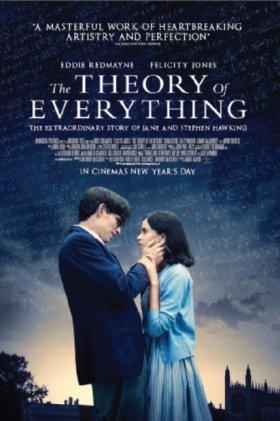Before becoming one of the most known physicists, Stephen Hawking, here played by Eddie Redmayne, spent his time studying in Cambridge university where he met his future wife, Jane Wilde (Felicity Jones). Whilst Stephen had to find a subject to write about for his thesis, he got diagnosed with a motor neuron disease and was given two years to live. But Stephen managed to go beyond these pessimistic predictions and went through the different and difficult challenges with the precious help of his wife. The prodigious man has also succeeded in becoming influential in the scientific field by elaborating diverse theories about time and black holes.
The Theory of Everything, directed by James Marsh, is a great and interesting biopic as it focuses on the everyday life of the famous scientist, Stephen Hawking. Instead of showing the different scientific prowess of the internationally recognised physicist, the film throws light on the private life of the remarkable man. And although the emphasis is put on the intimacy of the public man, the film neatly avoids any uncomfortable voyeurism. The scientist and his family are depicted in a sympathetic and way. The film is rather kindly towards Stephen Hawking and his relatives. A case in point concerns Stephen’s illness. Whereas the terrible aspects of his disease, are clearly displayed on the screen, his dignity is never undermined in the film. Indeed, even though Stephen is shown incapable of walking, moving or speaking, he appears intellectually efficient and brilliant. The Theory of Everything glorifies the mind over the body which is pictured as incompetent and failing. Intellectual capacities are presented as being more powerful than the physical abilities. This is illustrated when Stephen asks his doctor if the disease will affect his brain. When he is told it will not have any impact on his intellect, Stephen seems reassured. The joy of life that the scientist has and which is shown in the film depends on his intact and exceptional mental activity. Even if Stephen is portrayed as physically weak and dependent on others, he is depicted as a smart and humorous man who continues to see the life in the brightest way. The physicist turns out to be a true example, not only because he is very intelligent, but also because he brilliantly overcomes each steps of his disease, remaining a happy, lovable and inspiring man.
Also, The Theory of Everything celebrates the people who have helped Stephen Hawking during his life, such as his wife, Jane, Jonathan Hellyer Jones (Charlie Cox) and Elaine Mason (Maxine Peake). Not only are all these people favourably portrayed, they also appear crucial to the well-being of Stephen who always accepts their help. The focus is particularly put on Jane Hawking. She is depicted as a devoted woman who chooses not to give up on the man she loves. Her feelings towards Stephen are truly touching. It is made clear in the film that Jane will do anything and everything to support her husband, Stephen, in his everyday fight against the disease. She never does it out of pity, she acts this way because she loves him. She even sacrifices a prestigious future to look after Stephen and to encourage him in his scientific work. Jane can really be considered as a heroine. Without her help, Stephen might not have been the strong man he has been, and maybe the famously recognised scientist would have never existed.
Overall, The Theory of Everything is a fabulous film showing the ordinary life of an extraordinary man, who was lucky enough to benefit from the exceptional help from outstanding people.
